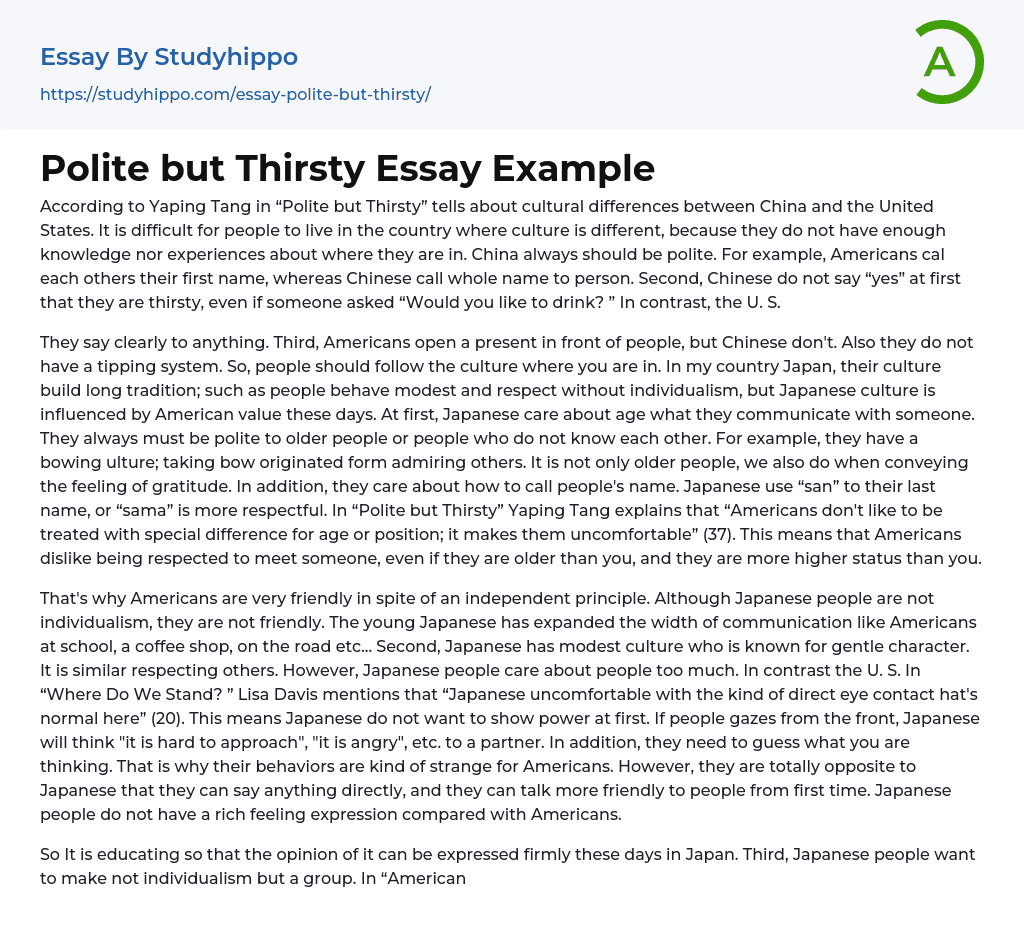According to Yaping Tang in “Polite but Thirsty” tells about cultural differences between China and the United States. It is difficult for people to live in the country where culture is different, because they do not have enough knowledge nor experiences about where they are in. China always should be polite. For example, Americans cal each others their first name, whereas Chinese call whole name to person. Second, Chinese do not say “yes” at first that they are thirsty, even if someone asked “Would you like to drink? ” In contrast, the U. S.
They say clearly to anything. Third, Americans open a present in front of people, but Chinese don't. Also they do not have a tipping system. So, people should follow the culture where you are in. In my country Japan, their cul
...ture build long tradition; such as people behave modest and respect without individualism, but Japanese culture is influenced by American value these days. At first, Japanese care about age what they communicate with someone. They always must be polite to older people or people who do not know each other. For example, they have a bowing ulture; taking bow originated form admiring others. It is not only older people, we also do when conveying the feeling of gratitude. In addition, they care about how to call people's name. Japanese use “san” to their last name, or “sama” is more respectful. In “Polite but Thirsty” Yaping Tang explains that “Americans don't like to be treated with special difference for age or position; it makes them uncomfortable” (37). This means that Americans dislike being respected to meet someone, even i
they are older than you, and they are more higher status than you.
That's why Americans are very friendly in spite of an independent principle. Although Japanese people are not individualism, they are not friendly. The young Japanese has expanded the width of communication like Americans at school, a coffee shop, on the road etc... Second, Japanese has modest culture who is known for gentle character. It is similar respecting others. However, Japanese people care about people too much. In contrast the U. S. In “Where Do We Stand? ” Lisa Davis mentions that “Japanese uncomfortable with the kind of direct eye contact hat's normal here” (20). This means Japanese do not want to show power at first. If people gazes from the front, Japanese will think "it is hard to approach", "it is angry", etc. to a partner. In addition, they need to guess what you are thinking. That is why their behaviors are kind of strange for Americans. However, they are totally opposite to Japanese that they can say anything directly, and they can talk more friendly to people from first time. Japanese people do not have a rich feeling expression compared with Americans.
So It is educating so that the opinion of it can be expressed firmly these days in Japan. Third, Japanese people want to make not individualism but a group. In “American Values and Assumptions” Gary Althen explains that “They are trained from very early in their lives to consider themselves as separate individuals who are responsible for their own situation in life and their own destinies. ” (5). This means that Americans get used to solving problems
by themselves because they believe that it is their own business.
Communication skills make a living for Japanese. Since Japanese have not learned the capability to build human relations only for how to build a group like association with the family till then. Separating from organization action makes people's trouble and feeling uneasy. In these days, although the individualism opinion also began to appear, the group still remains mentally. That is why easy to control people such as a media, a rumor and a magazine etc... Individualism is the things that Japanese should learn form Americans to benefit their next generation.
In conclusion, Japanese people always belong to some group like a family or a company, and mainly respect to people anytime; such as age, bowing, modest culture and not individualism. That is bring about sense of security for people. Although they are trying to be Americans character that more friendly and independent heart. “Closely associated with their assumption that they can bring about desirable changes in the future is the Americans assumption that their physical and social environmental are subject to human domination or control” (Althen9) in American Value and Assumptions(2003)
- Child essays
- Childcare essays
- Child labor essays
- Doll essays
- Business Law essays
- Contract essays
- Consumer Protection essays
- Property essays
- Ownership essays
- Agreement essays
- Common Law essays
- Contract Law essays
- Justice essays
- Security essays
- Tort Law essays
- United States Constitution essays
- Crime essays
- Lawsuit essays
- Treaty essays
- Family Law essays
- Marijuana Legalization essays
- Constitution essays
- War on Drugs essays
- Court essays
- Jury essays
- Police essays
- Protection essays
- Community Policing essays
- Criminal Law essays
- Judge essays
- Lawyer essays
- Employment Law essays
- Copyright Infringement essays
- Injustice essays
- Intellectual Property essays
- Breach Of Contract essays
- Jurisprudence essays
- Social Injustice essays
- Juvenile Justice essays
- Internet Privacy essays
- Cyber Security essays
- Bill Of Rights essays
- Civil Liberties essays
- First Amendment To The United States Constitution essays
- Fourth Amendment To The United States Constitution essays
- Second amendment essays
- Animal Cruelty essays
- Law Enforcement essays
- Juvenile Justice System essays
- Surveillance essays




